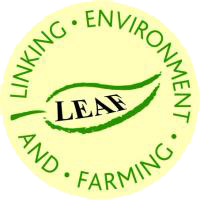Lyburn Farm has grown vegetables for about 30 years now, alongside the herd of 170 dairy cows. Crops grown over this period have been, early bunched carrots, broad beans, runner beans, and more latterly, the principal crops were sweet corn, pumpkin and squash. However over the years the market place has changed quite dramatically no to mention the environment around us, so we have endeavoured to change with it. So we now grow, organic lettuce, broad beans, french beans, runner beans, sugar snap peas, courgette, sweet corn pumpkin and squash, and deliver in central southern England, specifically Hampshire Wiltshire and Dorset.
Broad Beans
Broad Beans have generally done well in our early years of organic production. Birds have been our biggest problem, they do like digging up the untreated seed and will completely wipe out your crop. The only way to keep them out is with a mesh or a fleece. The four drillings serve us well and give us a cropping period of about 6 weeks.We are generally lucky to avoid the blackfly, they can make such a mess of the crop.
Sugar Snap Peas and Pod Peas
Sugar snap peas are small, rounded pods, containing tiny peas. They are similar to mange tout, and the whole pod is eaten, but they are plumper. Sugar snaps have a fresh, sweet flavour and a crunchy texture. Look for bright green, crisp pods, which are full of peas but not bursting at the seams. They are half way between a normal garden pea and a Mange Tout. They are not that easy to pick and that is where the cost is, but you do eat everything.
Runner Beans
Organically we have had some real disasters growing the runner bean. However with a little bit of persistence and a change in the rotation, the crop has performed better, but still can look a bit yellow, synonymous with not enough plant food. However last year was an exelent year. The beans are of a good quality, but probably not as big or as long as a conventional crop. One of the biggest problems here is keeping the deer out, especially the Roe, they are very partial to Runner Beans. The area is planted under low tunnels and can suffer from slug damage.
Courgette
Courgette can be a bit fickle, they do like their heat. It fits in nicely with the other summer crops that we do and there is a keen demand for good quality courgette. They never look as green and as vigorous as the conventional but yield reasonably well. We have a few problems with mildew, but in general, survive quite well.
Dwarf beans or French beans
This was a new crop for us in 2010. We mange to keep the weed out with the inter row hoe, and we have to avoid soil splash with irrigation or they can get in a right mess. They can if you keep on picking them hard enough, keep growing for quite a long period. There is a strong demand as you never throw anything away unlike a broad bean and it pod, but the picking cost is one of the biggest drawbacks.
Sweetcorn
This is a crop we have grown for some 30 years or more and know it quite well. Not always the easiest crop to grow, and now that we have ground that is not totally over run by Fallow deer, we are back into the crop. Weed control is always the biggest problem, after the deer that is, and we quite often have to revert to hand hoeing, to get on top of the weeds. We do have our own reservoir so water is not a problem for us, and Sweet Corn, can certainly use water.
Onion Squash
Is a member of the pumpkin family, and they come in all manner of shapes, colours and sizes. Butternut is generally the most popular and well known squash, but is very difficult to grow in this country, as the summers are not hot enough, although we do persist. So we are growing Green Kabocha, Acorn, Gem, Harliquin and a few other bits and pieces. This is one of the most truly versatile vegetables we have ever grown.
Pumpkin
There is an area of about 4 acres down to pumpkin. They are all of the culinary size, about 1-2kgs. We normally use Baby Bear , not an easy variety to grow , it is very reluctant to get started in May and seems to lack vigour. However once they have got away they are quite prolific and produce a number of fruit to the plant. Anyone who needs a number of these will need to order them in advance, as we tend to grow to order.
Gem Squash
Another member of the cucurbit family, a little bit bigger than a cricket ball and nearly as hard!! This is a hybrid that originally came from a wild squash in Mexico and a wild squash from Central US. Generally boiled or baked and favoured by the people of South Africa. Regarded as a summer squash, but does tend to keep very well and will keep until November, stored in the right conditions.
Farm History
Lyburn farm lies on the northern edge of the New Forest, straddling the small river Blackwater, and has been farmed by the Smales family and Mike and Judy in particular for the last 43 years. The river Blackwater rises on some of the high ground of the forest and as the heather and gorse gives way, to the old ancient oak forest, home of the fallow deer, the countryside falls away sharply towards the north. In the bottom of the valley you will find the Hamptworth estate, of which Lyburn farm is part.
The name Lyburn, is in fact quite unique, it is derived from the Scottish, lye ‘born’, and burn ‘river’, ‘borne by the river’, and with the Blackwater on either side we certainly are.
Read More
15 years ago we joined the Soil Association, and converted 37 acres of our vegetable ground to organic status. Having completed our 2 year conversion period on March 1st, 2001 , we were in a position to supply Organic vegetables. Time never stands still, and in 2004 it became obvious that we were going to need more ground, so we put into conversion another 20 acres, and then another 30 acres in 2005. Growing organic vegetables on a commercial scale is not as easy as you might think. All the easy options of fertilizer and chemicals are not available to you, and as a result much more hand labour and timeliness is required.


